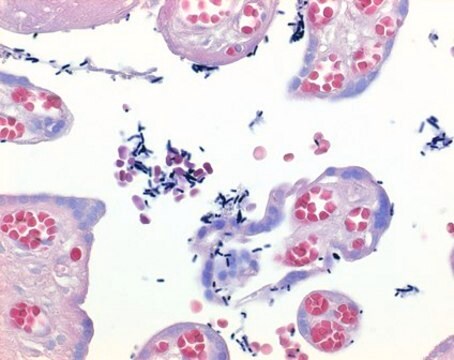1.09065
Perchloric acid solution
c(HClO₄) = 0.1 mol/l (0.1 N), in anhydrous acetic acid, reag. Ph. Eur., USP, ready-to-use volumetric solution for titration in non-aqueous media, Titriplex®
Synonym(s):
PCA
About This Item
Recommended Products
Product Name
Perchloric acid, in anhydrous acetic acid, for titrations in non-aqueous media c(HClO4) = 0.1 mol/l (0.1 N), Titripur®, reag. Ph. Eur., reag. USP
Agency
reag. Ph. Eur.
reag. USP
Quality Level
product line
Titripur®
form
liquid
autoignition temp.
485 °C
quality
Analyzed in our ISO 17025 accredited QC lab
reaction suitability
reaction type: Acid-base reactions
concentration
0.1 M
technique(s)
titration: suitable
pH
0.1 (20 °C in H2O)
transition temp
flash point 40 °C
density
1.06 g/cm3 at 20 °C
storage temp.
15-25°C
SMILES string
OCl(=O)(=O)=O
InChI
1S/ClHO4/c2-1(3,4)5/h(H,2,3,4,5)
InChI key
VLTRZXGMWDSKGL-UHFFFAOYSA-N
Looking for similar products? Visit Product Comparison Guide
Application
- Determination of phosphorus in commercially available milk: Utilizing ion chromatography with perchloric acid deproteinization, this application provides a reliable method for analyzing phosphorus content in dairy products, essential for quality control in the food industry (Yoshikawa et al., 2024).
- Versatile ferrous oxidation-xylenol orange assay for lipoxygenase activity: This high-throughput screening technique leverages the reactivity of perchloric acid in enzymatic assays, enhancing the detection of lipoxygenase activity crucial for biotechnological applications (Chrisnasari et al., 2024).
- Nanoporous gold with microporous structure: Perchloric acid is used in the electrochemical dealloying process to create nanoporous gold structures, which are significant for their applications in catalysis and sensor technology (Li et al., 2024).
- Stability indicating reversed-phase-high-performance liquid chromatography method: This method uses perchloric acid for the analysis of pharmaceutical compounds, offering enhanced stability and reliability for drug formulation and safety checks (Chintala, 2024).
- Development of innovative methodology for determination of 6-thioguanine: By utilizing perchloric acid, this HPLC-PDA-based technique allows for precise medical diagnostics, facilitating better disease management through accurate drug monitoring (Noga et al., 2023).
Features and Benefits
This volumetric solution is analyzed by our calibration laboratory D-K-15185-01-00 which is accredited according to DIN EN ISO/IEC 17025 for analysis of amount-of-substance concentrations in volumetric solutions by DAkkS (Deutsche Akkreditierungsstelle - German National Accreditation Body). The accreditation certificate can be found at www.sigmaaldrich.com/ISO17025.
Packaging
Analysis Note
Amount-of-substance concentration 0.0995 - 0.1005 mol/L
Measurement uncertainty ± 0.0003 mol/L
Traceability NIST SRM
The concentration is determined by volumetric titration and refers to 20°C.
The amount-of-substance concentration of this volumetric solution is traceable to a primary standard reference material (SRM) from the National Institute of Standards and Technology, Gaithersburg, USA (NIST SRM 84 potassium hydrogen phthalate) by means of volumetric standard potassium hydrogen phthalate (article number 1.02400), certified reference material according to ISO 17034, analyzed by our accredited calibration laboratory of Merck KGaA, Darmstadt, Germany according to DIN EN ISO/IEC 17025. The uncertainty is expressed as expanded measurement uncertainty with a coverage factor k=2 covering a confidence level of 95%.
Note: The titer is a correction factor to correct for variations of the volumetric solution, the titration equipment, the temperature and other laboratory conditions. For correct titration results it is recommended to determine a titer with the laboratory specific equipment and under laboratory specific conditions directly after opening a new bottle and at regular time intervals.
Legal Information
related product
Signal Word
Danger
Hazard Statements
Precautionary Statements
Hazard Classifications
Eye Dam. 1 - Flam. Liq. 3 - Skin Corr. 1A
Storage Class Code
3 - Flammable liquids
WGK
WGK 1
Flash Point(F)
104.0 °F
Flash Point(C)
40 °C
Certificates of Analysis (COA)
Search for Certificates of Analysis (COA) by entering the products Lot/Batch Number. Lot and Batch Numbers can be found on a product’s label following the words ‘Lot’ or ‘Batch’.
Already Own This Product?
Find documentation for the products that you have recently purchased in the Document Library.
Customers Also Viewed
Related Content
Karl Fischer titration determines water content in raw materials and products, a widely used analytical method.
Our team of scientists has experience in all areas of research including Life Science, Material Science, Chemical Synthesis, Chromatography, Analytical and many others.
Contact Technical Service










